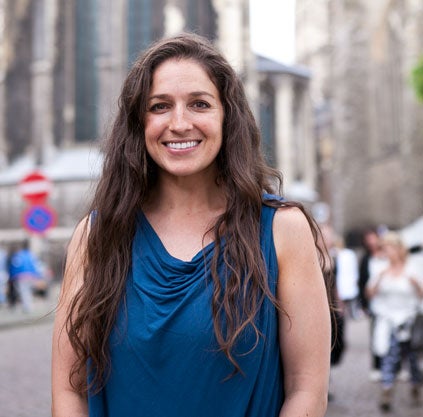 Melissa Siegel ’03 doesn’t mess around. She jumps at opportunity, scoffs at distraction and charges at conflict. She’s got plans. She’s got goals. She doesn’t waste any time. Frankly, she doesn’t have any to waste.
Melissa Siegel ’03 doesn’t mess around. She jumps at opportunity, scoffs at distraction and charges at conflict. She’s got plans. She’s got goals. She doesn’t waste any time. Frankly, she doesn’t have any to waste.
Here’s why: She teaches graduate courses in migration studies and leads the migration and development research group in the Maastricht Centre for Citizenship, Migration and Development at Maastricht University and the migration studies group at the Maastricht Graduate School of Governance and the United Nations University (UNU-MERIT) in The Netherlands; she coordinates and oversees the Migration Management Diploma Program and the migration specialization at the School of Governance and UNU-MERIT; she is a research associate at the Center on Migration, Policy and Society and the International Migration Institute at the University of Oxford; she trains international organizations (e.g., UNICEF, UNHCR) and governments (e.g., Dutch, German, Swiss, Iranian) in migration
issues; and she’s always jetting off to places like Moldova, Ethiopia, Burundi, Afghanistan, Georgia, Morocco and Suriname for field research.
“I am really good at being busy,” Siegel shrugs, adding: “I always say that my best quality is my ability to suffer. I’m really good at being uncomfortable – mentally and physically.”
Siegel, however, has never had time to do anything but roll with the punches. She’s been on the fast track to success ever since graduating from the Honors College with a degree in economics. In addition to being inspired (and terrified) by her economics professors Calvin Blackwell and Jane Clary, Siegel credits the College for preparing her for what has been a whirlwind career.
“The College in general offers so many ways to study the world,” she says, “and economics gives you a nice background of how the world works.”
And so, at Utrecht University, she started studying law and economics, policy and organization and underground banking, money laundering and remittances. Eventually, however, she landed at Maastricht University for her postdoctoral work and became interested in migration. The rest, as they say, is history.
“What’s fascinating about migration and migration policy is that there’s so much going into it – economically, culturally, politically and historically –
that you can predict the future and change it,” says Siegel, who could have told you years ago that Syria was headed into a refugee crisis. What she sees for the future isn’t so bright, either.
“What I see happening is not a migration crisis, but a humanitarian crisis on a global scale. This could be avoided by countries doing what’s morally right. I see a huge missed opportunity to not only step up and do what’s right, but also take in highly educated, hardworking people and add them to their populations,” she says. “The other thing is that the situation in Syria isn’t improving, so this problem isn’t going away. We should be planning for years.”
And, she says, there’s no time to waste. The time is now. That’s something she tries to convey to the students whom she and Stephanie Wheeler ’03 teach at the Honors College.
That’s right, somehow Siegel manages to come back to Charleston to teach Global Perspectives on Poverty, Inequality and Vulnerability every summer.
“I think it’s important for American students to understand global equality –
these are bright students, but they have such a narrow view of the world and what’s happening around it,” she says, noting that she encourages all undergraduates to study abroad. “And not just in England. When you’re most uncomfortable is when you learn the most. Also, look at the courses, not the countries. Go where they offer things you’re interested in.”
And, consider Maastricht University: Siegel has established an internship between the Honors College and her institution just for that purpose.
“I really want to strengthen the ties between the College and Maastricht,” she says. “Plus, I have a soft spot for the College of Charleston, so if I can offer a global perspective to its students, I am happy to do that. That’s my goal.”
Not surprisingly, it’s not her only one.
“In five years, I want to lead my center,” she says. “I want to become dean. Then I want to be provost.”
Nope: Siegel isn’t messing around.
- Alicia Lutz ’98




